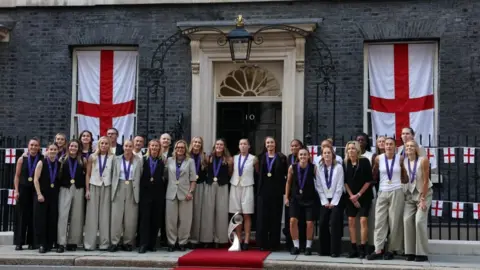The England women’s football team, affectionately known as the Lionesses, returned home to a roaring welcome from jubilant fans following their triumphant victory in the UEFA Euro 2025. They faced off against Spain in the final match, which was held at the St. Jakob-Park stadium in Basel, Switzerland. Celebrating their remarkable achievement, the Lionesses landed at Southend Airport, greeted by hundreds of supporters waving flags and donning the national colors in a show of solidarity and pride.
The atmosphere was electric as fans eagerly awaited their heroes. The excitement reached a crescendo as the team emerged from the airport, proudly displaying their trophy. Their arrival was just the beginning of a series of celebrations designed to honor their victory. After touching down, the players boarded a coach headed to Downing Street for an official reception hosted by Deputy Prime Minister Angela Rayner, further enhancing the day’s significance.
During this reception, Rayner expressed immense pride in the Lionesses, stating, “The Lionesses have brought it home again, and what a fantastic feeling that is. Champions of Europe again.” In a light-hearted moment, she acknowledged the passion and dedication of the players in setting an inspiring example for women’s football in the UK. The players received further recognition as they presented Rayner with a signed England shirt, while guests enjoyed canapes and drinks in the picturesque garden of No 10.
The celebrations didn’t stop there; on the following day, a grand open-top bus parade through central London was planned. The procession was set to make its way along The Mall, culminating in a ceremony at the iconic Queen Victoria Memorial, a location steeped in British history and significance. This public celebration was designed to allow fans to directly engage with the monumental success of their national team.
On the pitch, the Lionesses exhibited remarkable resilience by defending their European title with a thrilling 3-1 victory in a penalty shootout after the game had been drawn. Chloe Kelly’s winning penalty kick, combined with exceptional saves from goalkeeper Hannah Hampton, propelled the squad to reclaim their championship status, marking them as the first English team to win a major tournament on foreign soil. The match’s broadcast captivated more than 16 million viewers across the UK, solidifying its place as the most-watched TV moment of the year to date.
As they celebrated their victory, Leah Williamson, the team’s captain, was a beacon of leadership, walking down the airplane steps with coach Sarina Wiegman in front of the adoring crowd. Dressed in personalized tracksuits and adorned with winners’ medals, the Lionesses posed for photographs, capturing the joyous essence of their achievement. Their appearance at Southend was a heartfelt moment, marked by their first steps back on home ground after a successful tournament.
Prime Minister Sir Keir Starmer, who was away in Scotland, managed to engage with the team via video call, highlighting the continuing support from national leadership. The well-deserved accolades also extended to King Charles III, who praised the team’s efforts and called on them to aim for victory in the upcoming 2027 World Cup.
Calls for the Lionesses to receive national honors were met with government acknowledgment of the independent nomination process for such recognitions. Yet, many urged that their unparalleled contributions should not go unnoticed. Despite discussions about a potential bank holiday to celebrate this monumental victory, Downing Street indicated that the economic implications of additional public holidays would not warrant such proposals. Nevertheless, the Royal Mail announced a special commemorative postmark celebrating the Lionesses’ triumph, ensuring that their success would be remembered through even the smallest gestures.
In reflection, this victorious return heralds a new chapter for women’s football in England, celebrating the skill, determination, and spirit of the Lionesses while encouraging a nationwide movement towards greater recognition and support for women’s sports. Their achievements signal a brighter, more inclusive future for athletes across all genders in the realm of football. With the Euro 2025 title secured, the eyes of the nation now shift towards the promise of future victories, including the World Cup in 2027.












